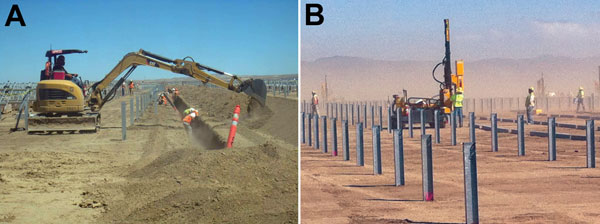Volume 21, Number 11—November 2015
Research
Coccidioidomycosis among Workers Constructing Solar Power Farms, California, USA, 2011–2014
Figure 3

Figure 3. Conditions during solar farm construction in San Luis Obispo County, California, USA. A) Localized dust generation associated with a soil-disruptive activity. Photograph was taken during the week of July 28–August 3, 2013 (courtesy of Aspen Environmental Group). B) Ambient dust exposure because of high-wind conditions. Photo was taken on March 5, 2013 (courtesy of Dennis Shusterman).
1Current affiliation: California Department of Public Health, Richmond, California, USA.
Page created: October 16, 2015
Page updated: October 16, 2015
Page reviewed: October 16, 2015
The conclusions, findings, and opinions expressed by authors contributing to this journal do not necessarily reflect the official position of the U.S. Department of Health and Human Services, the Public Health Service, the Centers for Disease Control and Prevention, or the authors' affiliated institutions. Use of trade names is for identification only and does not imply endorsement by any of the groups named above.